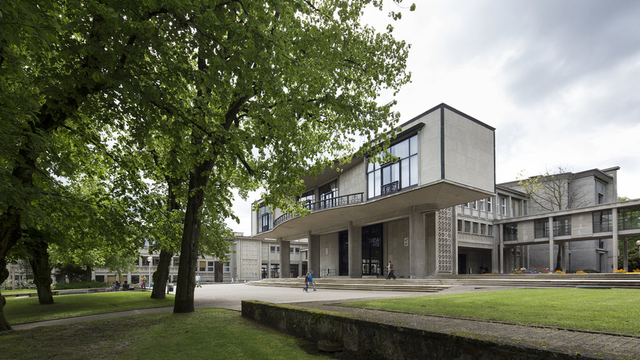On May 29th 2019, I was invited by Dr. Fadia Dakka to present my current research on rhythmanalysis and adult education at the Chasing Rhythm: Encounters at the Edge of Academic and Epistemological Traditions conference, held at Birmingham City University. This was a great opportunity for me to introduce my current reflections around the temporalities of adult education and the rhythmic dimensions of adult development, transformative processes and lifelong learning.
Université François-Rabelais, Tours, France (Photo: M. Alhadeff-Jones, 2017)
Le 11 décembre 2017, j'ai été invité à présenter certaines de mes réflexions autour des rythmes de la formation dans le cadre du Séminaire transversal organisé avec les étudiants de Master 2 (SIFA et IFAC) (ingénierie, formation d'adultes et accompagnement) du Département des sciences de l'éducation et de la formation de l'Université de Tours. Ci-dessous figure le lien vers l'enregistrement vidéo de ma présentation. Celle-ci s'organise autour de quatre axes de questionnement: (1) Comment définir le temps en formation? (2) Comment envisager les rapports entre temps et formation? (3) Comment concevoir les temporalités de l'autoformation et des processus de transformation? (4) Comment envisager la formation dans une perspective rythmologique?
Maison des Sciences de l'Homme – Paris Nord (Photo: M. Alhadeff-Jones, 2017)
Le 27 octobre 2017, j'ai été invité par les membres du Collège international de recherche biographique en éducation (CIRBE) à présenter certaines des réflexions développées dans mon dernier livre au sujet des temporalités des processus d'émancipation. Ci-dessous figurent les liens vers les enregistrements vidéo de mon intervention dans le cadre du séminaire doctoral et post-doctoral organisé par le CIRBE et l'Université de Paris 13 Sorbonne à la Maison des Sciences de l'Homme.
Université de Fribourg, Bâtiment Miséricorde (Photo: Keystone)
Le 26 juin 2017, j'ai eu le privilège de présenter à Fribourg la conférence introductive du Congrès de la Société Suisse pour la Recherche en Education (SSRE). Cette année, le thème du congrès était "Les temps de l'éducation et de la formation"; l'occasion pour moi d'exposer trois thèses centrales dans mes recherches sur les temporalités de l'éducation, afin d'engager le dialogue avec les participants de ce colloque. Les enregistrements vidéo de mon intervention figurent ci-dessous.
Jean Piaget (1896-1980) (source: https://it.wikipedia.org/wiki/File:Jean-piaget.jpg)
The experience of regression tells something about where a person stands (mentally, emotionally, socially). It expresses something about the present situation, as much as it reveals connections with the past and a possible future. The experience of regression appears therefore as a temporal marker. It is a marker because it draws attention to our own way of being through an unusual pattern of behavior. In this post, I explore how questioning one's experience of regression constitutes a way to learn something relevant about where we are in time, that is, where we are in relation to where we used to be, or where we may be in the future, and how we relate to such changes.
Russell Hall, Teachers College Library (New York)
This is the video recording of the presentation of my book "Time and the Rhythms of Emancipatory Education" organized at Teachers College, Columbia University, on March 21st, 2017.
Source: "The Very Hungry Caterpillar" by Eric Carle
Using time lapse videos showing the growth and transformation of a caterpillar into a butterfly, this post explores the rhythmic dimension of natural transformations, stressing how much they display both continuous and discontinuous features.
This post briefly locates the contribution of Henri Lefebvre – a French philosopher and sociologist – around the notion of rhythmanalysis.
This post briefly locates the contribution of Gaston Bachelard – a French philosopher of science – in regard to the notion of rhythmanalysis.





